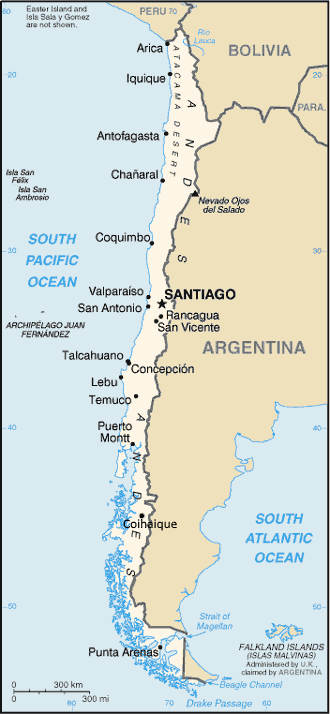|
Lebu, Chile
Lebu is a port city and commune in central Chile administered by the Municipality of Lebu. Lebu is also the capital of Arauco Province in Bío Bío Region. It lies on the south bank of the mouth of the Lebu River. The commune includes Mocha Island. History Lebu was first settled a little up the Lebu River from the site of the current city at Fort Santa Margarita built by García Hurtado de Mendoza at the beginning of 1557 on the north bank of the Lebu River by the salto de Gualgalén, to the west of the ford of Cupaño. In 1566 Governor Rodrigo de Quiroga built a fort almost in the same place as the present city of Lebu under the command of captain Agustín de Ahumada. Besieged here by the Mapuche it was finally abandoned in 1569. Fort Santa Margarita was destroyed in 1599, in 1603 it was rebuilt as Fort ''Santa Margarita de Austria'' by the Governor Alonso de Ribera. In the 20th century the town developed as coal mining centre. The 1960 Valdivia earthquake destroyed ... [...More Info...] [...Related Items...] OR: [Wikipedia] [Google] [Baidu] |
List Of Cities In Chile
This is a list of cities in Chile. A city is defined by Chile's National Statistics Institute (INE) as an "urban entity"An "urban entity" is defined by Chile's National Statistics Institute as a concentrated group of dwellings with over 2,000 inhabitants, or between 1,001 and 2,000 inhabitants if 50% or more of its population is economically active, dedicated to secondary and/or tertiary activities. Exceptionally, populated centers dedicated to tourism and recreation with over 250 concentrated dwellings and that do not meet the population requirement are considered urban. with more than 5,000 inhabitants. This list is based on a June 2005 report by the INE based on the 2002 census which registered 239 cities across the country. Complete list of cities by region Largest urban agglomerations This list includes conurbations, "absorptions" and cities with over 100,000 inhabitants, according to the 2017 census. {, {, class="wikitable sortable" , - !, !!Urban Entity!!Region! ... [...More Info...] [...Related Items...] OR: [Wikipedia] [Google] [Baidu] |
García Hurtado De Mendoza, 5th Marquis Of Cañete
García Hurtado de Mendoza y Manrique, 5th Marquis of Cañete (July 21, 1535 – May 19, 1609) was a Spanish Governor of Chile, and later Viceroy of Peru (from January 8, 1590 to July 24, 1596). He is often known simply as "Marquis of Cañete". Belonging to an influential family of Spanish noblemen Hurtado de Mendoza successfully fought in the Arauco War during his stay as Governor of Chile. The city of Mendoza is named after him. In his later position as Viceroy of Peru he sponsored Álvaro de Mendaña's transpacific expedition of 1595, who named the Marquesas Islands after him. Early life He was the son of Andrés Hurtado de Mendoza, 3rd Marquis of Cañete — also a viceroy of Peru — and Magdalena Manrique, daughter of the Count of Osorno. Both his parents belonged to some of the most influential families in the Spanish aristocracy. In 1552 Hurtado de Mendoza ran away from home with the intention of serving his king, Charles I (Emperor Charles V), in an exped ... [...More Info...] [...Related Items...] OR: [Wikipedia] [Google] [Baidu] |
José Baroja
José is a predominantly Spanish and Portuguese form of the given name Joseph. While spelled alike, this name is pronounced differently in each language: Spanish ; Portuguese (or ). In French, the name ''José'', pronounced , is an old vernacular form of Joseph, which is also in current usage as a given name. José is also commonly used as part of masculine name composites, such as José Manuel, José Maria or Antonio José, and also in female name composites like Maria José or Marie-José. The feminine written form is ''Josée'' as in French. In Netherlandic Dutch, however, ''José'' is a feminine given name and is pronounced ; it may occur as part of name composites like Marie-José or as a feminine first name in its own right; it can also be short for the name ''Josina'' and even a Dutch hypocorism of the name ''Johanna''. In England, Jose is originally a Romano-Celtic surname, and people with this family name can usually be found in, or traced to, the English county of C ... [...More Info...] [...Related Items...] OR: [Wikipedia] [Google] [Baidu] |
